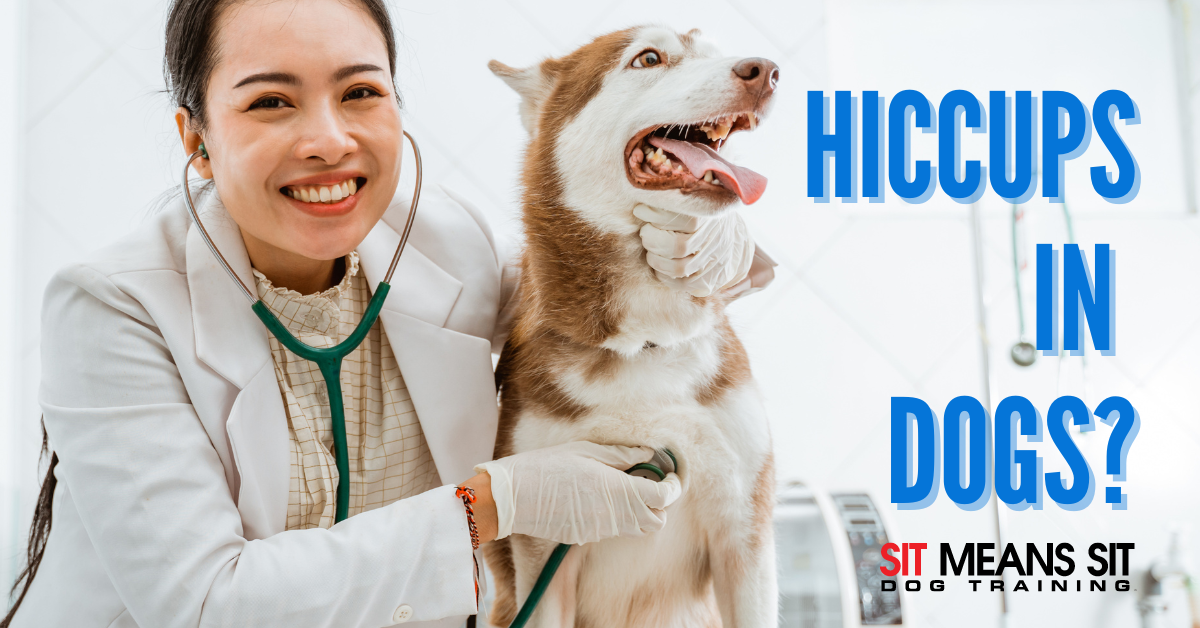
Does Fido Have the Hiccups?
In some ways, our furry friends are just like us. They share plenty of things as our companions: our homes, food, and many more aspects of our day-to-day lives. In fact, they are so like us to the point that they share the inconvenience that we call hiccups. Here are some ways to determine if Fido has the hiccups and how to get rid of this pesky phenomenon! Sit Means Sit wants your dog happy and healthy!
Causes for Hiccups in Dogs
Humans currently don’t exactly know the full cause of hiccups, but we do know how they function. Hiccups for Fido begin in the abdomen with the diaphragm. This muscle is essential to breathing, aiding the lungs in losing and gaining air by contraction. Sometimes, the diaphragm contracts suddenly and involuntarily, which changes the airflow in the lungs. This then causes the sound that we know as hiccups due to this new breathing pattern. Some theorize that hiccups in our furry friends are caused by the inhalation of too much air, the overexpansion of the stomach, or a leftover evolutionary development that tested breathing in the womb since puppies are more likely to have the hiccups.
Are hiccups in Dogs dangerous?
For the most part, Fido’s hiccups are not dangerous. More often than not, they are just an inconvenience for your furry friend and are not something to worry about unless they continue after one or two hours. Younger and older furry friends’ hiccups might occur more often, but as long as they go away quickly and are not too frequent, their hiccups are of little concern.
How to get rid of Fido’s hiccups
Similar to humans, our canine’s hiccups can be chased away by a few methods.
- Giving them a little spook through hide-and-seek can be helpful, but be sure not to seriously frighten your dog, as this might cause more hiccups.
- Room-temperature water with honey or a canine-safe syrup consumed slowly can prevent more hiccups.
- Modifying eating habits to eat less quickly reduces the stretching of the stomach muscles. If necessary, a slow feeder is a great option to help control their eating patterns.
- If your furry friend enjoys them, placing them on their back and giving them a good belly and throat rub can help to stimulate the muscles in their stomach and throat
- Light exercise like a slow walk changes their breathing patterns and can lessen hiccups in the process
- If Fido struggles with stress or overexcitement, calming cues lessen the effect of hiccups.
When should I be concerned?
If your pup’s hiccups are continual and do not seem to stop for long periods, it might be a good idea to take them to the vet. Hiccups can be a sign of larger health issues, including:
- Asthma and other respiratory tract issues
- Pneumonia
- Heart problems like pericarditis
- Temperature imbalances like hypothermia or heat stroke
- Gastrointestinal issues, like the ingestion of a foreign body, upset stomach, or nausea
- Parasitic infection (hookworms)
Your vet will want to take a look if your furry friend is not eating or drinking, seems to be in pain, excessively drooling, vomiting, wheezing, or has difficulty breathing. They will likely start with a physical exam along with bloodwork and urinalysis. Depending on these results, they might look for the cause of the hiccups through an abdominal ultrasound, X-rays, a CT scan, or an MRI.
All-in-all, hiccups in your pup are nothing to be worried about unless they’re persistent or causing your canine issues. Most of the time, you and your dog will just have to wait for this little inconvenience to pass.
